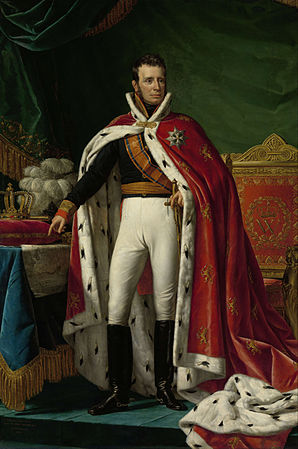Wikipedia:Wikipedia Signpost/Single/2014-09-24
Oil paintings galore
-
Summer Evening at Skagen. The Artist's Wife and Dog by the Shore (Danish: Sommeraften ved Skagen. Kunstnerens hustru med hund ved strandkanten)
-
The Maids of Honour (Spanish: Las Meninas)
-
Woman Holding a Balance
Featured articles
Six featured articles were promoted this week.
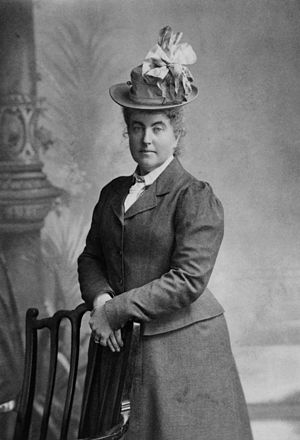
- Oriental Film (nominated by Crisco 1492), a film production company in Batavia, Dutch East Indies (now Jakarta, Indonesia), established by an ethnic Chinese businessman in 1940.
- Chris Gragg (nominated by Seattle), an American football tight end who plays for the Buffalo Bills of the National Football League.
- Flight Unlimited III (nominated by JimmyBlackwing), a not well-known game that bombed commercially and helped to bankrupt its developer.
- Tintin in Tibet (nominated by Prhartcom and Midnightblueowl), the 20th volume (1958) of 24 in The Adventures of Tintin, a comics series by Belgian cartoonist Hergé.
- "all things" (nominated by Gen. Quon). Written by lead actress Gillian Anderson, this is the 17th episode of the seventh season of the American science fiction television series The X-Files.
- Fanny Bullock Workman (nominated by Adam Cuerden). The nominator wrote: "She was a mountaineer, rock climber, suffragette, and feminist. It was one of the last articles being worked on by Adrianne Wadewitz before her untimely death, and between her excellent work and those of us wishing to finish it, we'd like to raise this up in her memory."
Featured lists
Four featured lists were promoted this week.
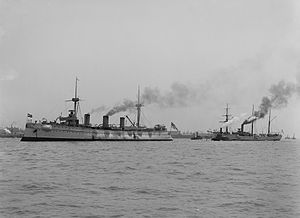
- List of English Heritage properties in Somerset (nominated by Rod), an illustrated, referenced and comprehensive list of the properties of English heritage in the county of Somerset.
- List of cruisers of Germany (nominated by Parsecboy), covering all of the cruisers built by Germany from the early 1880s to 1945, and spanning three navies.
- List of international cricket five-wicket hauls by Richie Benaud (nominated by Zia Khan) Former Australian captain Richie Benaud was one of the best cricket all-rounders of his time—the first to take 200 wickets and make 2,000 runs at Test level.
- Iggy Azalea discography (nominated by Simon); she is an Australian recording artist.
Featured pictures
Seventeen featured pictures were promoted this week.


- Las Meninas (1656) (created by Diego Velázquez, nominated by Sagaciousphil), long recognised as one of the most important paintings in Western art history.
- Daniel in the Lions' Den (created by Peter Paul Rubens, nominated by Hafspajen) The prophet Daniel is thrown into the den of the lions by the Persian king, Darius, due to the persian noblemen and ministers conspirations. An early work by Rubens.
- Five-hundred-dollar, one-thousand-dollar, five-thousand-dollar, ten-thousand-dollar, five-hundred-dollar, one-thousand-dollar, five-thousand-dollar, and ten-thousand-dollar Serial #1 Federal Reserve Notes from the series of 1918 and 1928 (created by the Bureau of Engraving and Printing and nominated by Godot13)
- Bharata Natyam Performance (created and nominated by Bellus Delphina)a classical Indian dance form that originated in the temples of Tamil Nadu.
- Summer Evening at Skagen. The Artist's Wife and Dog by the Shore (created by Peder Severin Krøyer, nominated by Belle) Marie Krøyer, the artist's wife, standing on the beach at Skagen with their dog Rap at her side and the moonlight reflected in the sea.
- Joseph and Potiphar's Wife (created by Rembrandt, nominated by Crisco 1492) A 1634 etching by Rembrandt (Bartsch 39). It depicts a story from the Bible, wherein Potiphar's Wife attempts to seduce Joseph. It is signed and dated "Rembrandt f. 1634" (f. for fecit or "made this"), and exists in two states.
- Man Writing a Letter and Woman Reading a Letter (created by Gabriël Metsu, nominated by Hafspajen) A set of two images
- Woman Holding a Balance (created by Johannes Vermeer, nominated by Hafspajen) a young woman holding an empty balance before a table on which stands an open jewelry box, the pearls and gold within spilling over.
- Press conference near the ground zero of the 2013 Dar es Salaam building collapse (created and nominated by Muhammad Mahdi Karim)
- William I of the Netherlands (created by Joseph Paelinck, nominated by Crisco 1492)
- The Great Day of His Wrath (created by John Martin, nominated by Hafspajen) Babylon the great is fallen, is fallen, and is become the habitation of devils, and the hold of every foul spirit, and a cage of every unclean and hateful bird. For all nations have drunk of the wine of the wrath of her fornication, and the kings of the earth have committed fornication with her, and the merchants of the earth are waxed rich through the abundance of her delicacies. - Revelation 18:2-3.
Featured topics
One featured topic was promoted this week.
- Looking Glass Studios video games (originally nominated by JimmyBlackwing as a good topic; automatically promoted due to Flight Unlimited III reaching featured status) "Looking Glass Studios was an American video game developer founded in 1990 as Blue Sky Productions by Paul Neurath in Salem, New Hampshire. The company's first game was Ultima Underworld: The Stygian Abyss in 1992, which received widespread critical acclaim and sold nearly 500,000 units. Looking Glass proceeded to develop titles in multiple genres, including role-playing, sports, flight simulation, and stealth video games. These titles were primarily published by Origin Systems, Electronic Arts and Eidos Interactive, with three titles self-published by Looking Glass Studios."
-
Man Writing a Letter
-
Woman Reading a Letter
-
William I of the Netherlands
Reader comments
Indian political editing, Neil deGrasse Tyson, Congressional chelonii
Are Indian politicians "sanitizing" their Wikipedia articles?

The Hindustan Times speculates (September 18) that politicians and their supporters are "sanitizing" their articles in advance of the 2014 Maharashtra State Assembly election. The October 15th election is for seats in the Legislative Assembly, the lower house of the bicameral legislature of Maharashtra, the second most populous state of India. The Times notes the absence of significant controversies in the articles of particular politicians and the presence of heavily promotional language. One politician is praised for his "commitment to social work", another for her "elegant dressing" and her "fashion sense", a third is identified as a "youth icon". The politicians specifically mentioned by the Times are:
- Sachin Ahir, MLA from Worli, Nationalist Congress Party
- Devendra Fadnavis, MLA from Nagpur, Bharatiya Janata Party
- Shraddha Jadhav, former Mayor of Mumbai, Shiv Sena
- Patangrao Kadam, MLA from Palus-Kadegaon, Indian National Congress
- Baba Siddique, MLA from Vandre West, Indian National Congress
- Kripashankar Singh former Mumbai Regional Congress Committee president, Indian National Congress
It is not known who is responsible for these particular edits, but it is known that politicians in India have wanted such changes. The Times quoted a "social media consultant" from Pune, Maharashtra's second largest city, who said that politicians often sought "to sanitise their Wikipedia profiles. While some insist on weeding out inconvenient facts, others also insist on inserting words of praise." User:Tinucherian, a former boardmember of Wikimedia India, explained to the Times that Wikipedia editors and administrators don't always notice these sorts of changes to articles immediately. An examination of the edit histories of these articles shows that some of the edits in question were made well in advance of the current election. For example, all mention of the Disproportionate Assets investigation of Kripashankar Singh was removed from his article a year ago, in September 2013, by an IP address originating in Mumbai, the capital city of Maharashtra. What appears to be a pre-written promotional biography of Patangrao Kadam was added to the end of his article in July of this year by another Mumbai-based IP address.
Conservative "war" on Neil deGrasse Tyson reaches Wikipedia

The Daily Beast and Physics Today reported on the latest salvo in the conservative "war" on astrophysicist Neil deGrasse Tyson, director of the Hayden Planetarium and perhaps the most prominent scientist in the United States. Tyson is a popular science communicator, frequent public speaker and television guest, hosted the widely watched 2014 television series Cosmos: A Spacetime Odyssey, and has 2.4 million followers on Twitter. He is an outspoken critic of creationism, climate change denial, and anti-scientific stances taken by politicians.
There is even more outspoken criticism of Tyson on the right, where he is "widely despised", especially in the wake of the success of Cosmos. A month following the final episode of the series, the cover story of the conservative National Review, "Smarter Than Thou: Neil deGrasse Tyson and America's Nerd Problem", accused Tyson of being "the fetish and totem of the extraordinarily puffed-up 'nerd' culture that has of late started to bloom across the United States." Some on the left have charged that Tyson "hatred" is the result of “anti-intellectual paranoia” or even a racist reaction against the success of a prominent African-American.
In September, Sean Davis, co-founder of The Federalist, a year-old collective of conservative political opinion bloggers, launched a series of attacks on Tyson, later adding Wikipedia to his targets. Physics Today discusses the background of The Federalist, noting that the website's other co-founder and publisher was Ben Domenech, a senior fellow at the Heartland Institute, a conservative think tank at the forefront of promoting climate change denial. Domenech also co-founded the conservative blog RedState and resigned from the Washington Post in 2006 following a plagiarism controversy.
Davis wrote a series of articles accusing Tyson of "fabricating" quotes and anecdotes in his public presentations, most notably claiming that US President George Bush never made the 2001 statement "Our God is the God who named the stars" attributed to him by Tyson, writing that Tyson "butchered" a 2003 statement by Bush in a different context, "The same Creator who names the stars also knows the names of the seven souls we mourn today. " Conservatives from Ann Coulter to Ross Douthat echoed Davis' claim that Tyson was a "serial fabulist", but a senior editor at The Federalist complained to The Daily Beast about the lack of a reaction to Davis' charges outside the right-wing, a reaction which Beast characterized as "overwhelmingly dismissive". Tyson later responded to a letter from Davis asking for comment, a request dated a week after Davis' initial article about the Bush quote, writing "I have explicit memory of those words being spoken by the President", but later conceding that "I transposed one disaster with another (both occurring within 18 months of one another) in my assigning his quote."
Davis took aim at Wikipedia when a short passage about the Bush statement was inserted and then removed from the Wikipedia article about Tyson. Among the insults leveled at Wikipedia editors by Davis were "cultists", "Pravda’s heirs", and "Tyson’s Truthers". Other conservative publications echoed Davis' take on Wikipedia. The Weekly Standard claimed that "Wikipedia editors have rigorously deleted anything less than flattering from Tyson’s bio," while the National Review asserted that "text-burning followers" of Tyson were engaged in the "willful suppression of information." None of the criticism discussed any of the policy-based reasons that editors used to advocate either for or against inclusion of the passage, even in Davis' Buzzfeed-like list of "9 Absurd Edit Justifications By Wikipedia’s Neil Tyson Truthers" (which included a comment by this author).
Davis' post "Why Is Wikipedia Deleting All References To Neil Tyson’s Fabrication?" seemed to provide its own answer to that question, which was the political orientation of Wikipedia editors. Davis largely focused on one editor, User:Zero Serenity, highlighting the content of his blog and userboxes. Zero Serenity told the Signpost that "It felt like politics was the only reason The Federalist article was written...it seemed like The Federalist attempted to use Wikipedia to promote the story instead of letting it grow organically. Wikipedia is not meant as a tool to promote politics." Other editors on the talk page echoed his assessment, with one suggesting that, after the phrase "no evidence exists that Bush ever said" the statement in question was removed from the article following claims of inadequate sourcing, Davis included the phrase in a follow-up blog post in order to provide a source so that phrase could be restored.
When the Wikipedia article on The Federalist was proposed for deletion on grounds of notability, Davis charged that it was a retaliatory act by the "science-loving censors at Wikipedia". One editor, User:Gaijin42, told the Signpost he contacted Davis and attempted to explain the kind of sources that Wikipedia articles require, but Davis gave him the "runaround" and accused him of being engaged in "cultish religious zealotry in defense of Neil Tyson", despite the fact that he is politically conservative like Davis. Davis' article went on to compare the proposed deletion to book burning and defended the significance of The Federalist, ending by invoking Obi-Wan Kenobi: "You can’t win. If you strike us down, we’ll become more powerful than you can possibly imagine."
Senate Minority Leader Mitch McConnell still not a turtle

A Congressional vandal has struck again. User:143.231.249.138, an IP address assigned to the United States House of Representatives, was previously in the news for a series of what The Hill calls "controversial and juvenile edits" that were retweeted by the Twitter bot CongressEdits. (see previous Signpost coverage here and here) Some were legitimate but odd, while others were vandalism that earned the address a series of escalating blocks. Despite previous calls for an investigation, the identity of the person or persons responsible for these edits is unknown.
The Hill, USA Today, The Cincinnati Enquirer, Wonkette, The Week and New York were among the publications that reported on an example of the latest vandalism from that IP address after it was tweeted by CongressEdits. That edit, to the article for US Senate Minority Leader Mitch McConnell, read "McConnell is the first openly Otherkin member of Congress. His species identity is turtle." Comparing McConnell's facial features to a turtle, and more specifically the cartoon character Cecil the Turtle, is a long-running joke for many American comedians, especially Jon Stewart of The Daily Show, and websites, such as with the 2011 Daily Caller slideshow "Turtles that look like Mitch McConnell". In the 2014 Senate race in Texas, a Republican primary candidate even created a television ad which said McConnell "looks and fights like a turtle". The Cincinnati Enquirer noted, however, that "it was unclear whether [McConnell has] been called an otherkin before."
Buzzfeed reported that the same day the IP address also edited the article about the gaming website Kotaku. The edit accused the website of "being part of a vast conspiracy to promote Cultural Marxism through video games," citing the right-wing website Breitbart. Kotaku has been a target of the Gamergate controversy, a controversy that Buzzfeed calls a "movement of aggrieved and confused white nerds".
Following these and other edits, the IP address was blocked again, this time for three months.
In brief



- "A Forgotten Referendum On The Union Of Scots And English": Following the recent Scottish independence referendum, Matt Thompson from NPR's Code Switch team, discussed (September 21) the overwhelming rejection three years ago of a proposal to close the Scots-language Wikipedia. The author also discussed the origin of the Scots language, the impact upon the language when the Scottish King James also became the King of England, and the persistence of the Scots language in the spoken vernacular from then through the present.
- Most prolific editor: "Wikipedia is stronger than people realize": Gus Lubin interviewed Justin Knapp (User:koavf) for the Business Insider (September 19). Knapp was the first editor to contribute more than one million edits to Wikipedia. In the interview, he puts his achievement in perspective as part of a larger collaboration.
| “ | In terms of sheer numbers, there are only a couple of users which have near as many as me but the actual edit count is not as important as the quality. In that sense, many users have surpassed me. There are plenty of edits I make that have low value individually but you add them up and it makes the encyclopedia better. Other users put forth significant effort on a few edits that are very valuable individually. The thing that makes this project function is everyone doing their part. I'm impressed by anyone who puts forth serious, scholarly effort and freely shares that knowledge with the world, such as my late friend Adrianne Wadewitz. I am also particularly grateful to the software developers who make the back end structure of MediaWiki possible because they have skills that I entirely lack. | ” |
- Unsuccessful DC Mayoral candidate may have edited own biography: In the Loose Lips column from the Washington City Paper (September 19), Will Sommer concluded that Jack Evans, who represents Ward 2 on the Council of the District of Columbia, was receiving email and notifications from Wikipedia for User:Evansjack1, an account which has previously identified itself as Evans. (see previous Signpost coverage) Sommer obtained the emails through a Freedom of Information Act request. Independently, this was also a topic on the Conflict of interest noticeboard. The editor in question repeatedly removed information that was unflattering to the Councilman and unsuccessful Washington, DC Mayoral candidate.
- Learning to hate Comic Sans: In a digest of the typeface Wikipedia article in The A.V. Club (September 15), Mike Vago wrote about typography's millennium old East Asian roots, the accelerated changes in typography over the last 65 years, the legal thickets necessitating that publishing houses hire font lawyers, the comic book supervillain named Typeface, and the wide-spread loathing for and misuse of the Comic Sans typeface.
- More articles on Antarctica than Egypt: an article by Joseph Stromberg on Vox.com (September 14) about Wikipedia's geographical imbalance, reported on the January 21, 2014 Oxford Internet Institute study, "Uneven Geographies of User-Generated Information: Patterns of Increasing Informational Poverty."
Reader comments
99.25% of Wikipedia birthdates accurate; focused Wikipedians live longer; merging WordNet, Wikipedia and Wiktionary
A monthly overview of recent academic research about Wikipedia and other Wikimedia projects, also published as the Wikimedia Research Newsletter.
"Reliability of user-generated data: the case of biographical data in Wikipedia"
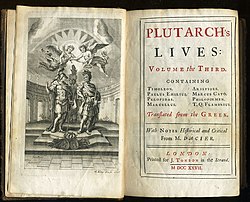
- Review by User:Maximilianklein
0.75% of Wikipedia birthdates are inaccurate, reported Robert Viseur at WikiSym 2014.[1] Those inaccuracies are "low, although higher than the 0.21% observed for the baseline reference sources". Given that biographies represent 15% of English Wikipedia,[supp 1] the third largest category after "arts" and "culture", their accuracy is important. The method used was to find biographies that were both in Wikipedia and 9 reference databases, which are sadly not named due to the wishes of an "anonymous sponsor" of the paper (Red flag or Belgian bureaucracy?). Of 938 such articles found, those whose birthdates did not match in all 10 databases – 14.4% – were manually investigated. Some errors were due to coincidental names, thus proving the point for authority control in collecting data. One capping anecdote is that most of the mistakes in Wikipedia's 0.75% were corrected in the intervening time between data collection and manual investigation. However, one may need to account for the sample bias that these were the biographies which existed in 10 separated databases – well known personalities. Therefore the predictive power of the study remains limited, but at least we know that some objective data on Wikipedia has the same order of magnitude error rate as other "reliable sources".
Focused Wikipedians stay active longer
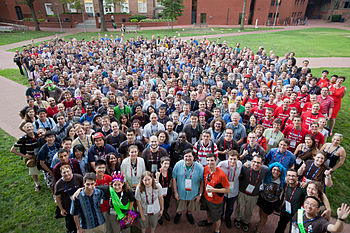
A new preprint[2] by three Dublin-based computer scientists contributes to the debate around editor retention. The authors use techniques such as the topic modeling and non-negative matrix factorization. to categorize Wikipedians into several profiles ("e.g. content experts, social networkers"). Those profiles, or user roles, are based on namespaces that editors are most active in. The authors analyzed the behavior of about half a million Wikipedia editors. The authors find that short-term editors seem to lack interest in any one particular aspect of Wikipedia, editing various namespaces briefly before leaving the project. Long-term editors are more likely to focus on one or two namespaces (usually mainspace, plus article talk or user talk pages), and only after some time diversify to different namespaces; in other words, the namespace distribution of edits over time "predicts an editor's departure from the community". The authors note that "we show that understanding patterns of change in user behavior can be of practical importance for community management and maintenance".
Unfortunately, the paper is heavy in jargon and statistical models, and provides little practical data (or at least, that data is not presented well). For example, the categorization of editors into seven groups is very interesting, but no descriptive data is presented that would allow us to compare the number of editors in each group. Further, the paper promises to use those profiles to predict editor lifecycles, but such models don't seem to be present in the paper. In the end, this reviewer finds this paper to be an interesting idea that hopefully will develop into some research with meaningful findings – for now, however, it seems more of a theoretical analysis with no practical applications.
"WordNet-Wikipedia-Wiktionary: construction of a three-way alignment"

- Reviewed by Andrew Krizhanovsky
The authors of this paper,[3] presented at the International Conference on Language Resources and Evaluation (LREC 2014), integrated two previously constructed alignments for WordNet-Wikipedia and WordNet-Wiktionary into a three-way alignment WordNet-Wikipedia-Wiktionary. This integration result in lower accuracy, but greater coverage in comparison with two-way alignment.
Wiktionary does not provide a convenient and consistent means of directly addressing individual lexical items or their associated senses. Third-party tools such as the JWKTL (Java-based Wiktionary Library) API can overcome this problem.
Since the WordNet–Wikipedia alignment is for nouns only, the resulting synonym sets in the conjoint threeway alignment consist entirely of nouns. However, the full three-way alignment contains all parts of speech (adjectives, nouns, adverbs, verbs, etc.).
Larger synonym sets in the source data (WordNet and Wiktionary) results in more incorrect mapping in the outcome alignment (this is strange from the average person's point of view and shows that the alignment algorithm is not perfect yet).
Informal examination shows that conjoint alignment is correct in general, but existing errors in the source alignments were magnified (snowball effect).
Briefly
- Measures of edit quality: A work-in-progress paper[4] reviews measures of edit quality on Wikipedia and reports the results of a pilot project to evaluate the "Persistent Word Revisions" (PWR)[supp 2] metric of edit quality with the ratings of Amazon's Mechanical Turk users. PWR measures how much of an edit is preserved through subsequent revisions to the article. The paper only evaluates "a small pool of 63 total [Mechanical Turk] ratings of 10 [article] revisions" and therefore has no significant results. Nonetheless, the future validation on a much larger set of edits as promised in the paper should be useful to future researchers. It will also be useful to know how the distribution of PWR scores compare with other measures of article quality such as the quality assessments given by WikiProjects, nominations for Good Article or Featured Article status. A comparison with Adler et al.'s WikiTrust scores could also be valuable.
- "A Wiki Framework for the Sweble Engine": This master thesis[5] builds on previous work of professor Dirk Riehle's research group at the University of Erlangen-Nuremberg which had constructed a formal parser for MediaWiki wikitext, adding a web application that allows editing wikis based on this parser.
- How quickly are drug articles updated after FDA warnings? A short article[6] in the New England Journal of Medicine examined how quickly safety warnings by the US Food and Drug Administration (FDA) for 22 prescription drugs were incorporated into the corresponding Wikipedia articles. The authors "found that 41% of Wikipedia pages pertaining to the drugs with new safety warnings were updated within 2 weeks ... The Wikipedia pages for drugs that were intended for treatment of highly prevalent diseases (affecting more than 1 million people in the United States) were more likely to be updated quickly (58% were updated within 2 weeks) than were those for drugs designed to treat less-prevalent conditions (20% were updated within 2 weeks ...)." See also the discussion at WikiProject Medicine: 1 2
- "Spiral of silence" in German Wikipedia's image filter discussions: A paper titled "The Dispute over Filtering 'indecent' Images in Wikipedia"[7] examines disputes in 2010 and 2011 about controversial content on Wikipedia, and about the Wikimedia Foundation's proposal for an opt-in image filter which would have allowed users to hide sexual or violent media for themselves (see the Signpost summary by this reviewer). The author finds that several of German sociologist Jürgen Habermas' criteria for public discourse apply to the lengthy discussions on the German Wikipedia about this topic (highlighting one talk page with 120 major threads that fill 175 pages in a PDF). "However, [Habermas'] criteria of rationality and objectivity seem to be less applicable. Compared to other areas of dispute in Wikipedia, the German discussions were civilized – but emotional." The paper invokes the "spiral of silence" theory of public opinion to explain the German Wikipedia's huge opposition to the Wikimedia Foundation's plans: "the climate of opinion in the online discussions put supporters of the image filter under heavy pressure to conform or to be silent". Finally, the paper reports on the results of a small web-based experiment where 163 participants were randomly shown one of three versions of the article de:Furunkel (boil): Either without images, or with a "neutral image", or "with a somewhat disgusting image of an infected boil." The author states that "The most interesting results for the Wikipedia community is that the disgusting image enhances the perceived quality of the article: It is perceived to be more fascinating (p=.023) and more worth reading (p=.032) than an article without any image."
Other recent publications
A list of other recent publications that could not be covered in time for this issue – contributions are always welcome for reviewing or summarizing newly published research.
- "Evolution and revolution of organizational configurations on wikipedia: A longitudinal network analysis"[8] From the abstract: "A new stepwise regression model-selection approach was used to detect significant shifts in the trends of inbound degree centralization, outbound degree centralization, betweenness centralization, assortativity, and social entropy [in the coauthorship network of editors and articles]. ... Finally, the moments of revolutionary change were compared with prominent media stories, news items referencing Wikipedia, and important policy changes and events on Wikipedia..."
- "Field experiments of success-breeds-success dynamics"[9] (coverage of earlier related papers by two of the authors: "Recognition may sustain user participation", ""No praise without effort: experimental evidence on how rewards affect Wikipedia's contributor community")
- "How collective intelligence emerges: knowledge creation process in Wikipedia from microscopic viewpoint"[10]
- "How accurate are Wikipedia articles in health, nutrition, and medicine?"[11]
- "Community and the dynamics of spatially distributed knowledge production. The case of Wikipedia"[12]
- "Group minds and the case of Wikipedia"[13] (see also coverage of an earlier paper by the author: "Wikipedia editing patterns are consistent with a non-finite state model of computation")
- "'The sum of all human knowledge': A systematic review of scholarly research on the content of Wikipedia"[14] (see also mailing list announcement and our coverage of a related paper by the same authors: "Wikipedia in the eyes of its beholders: A systematic review of scholarly research on Wikipedia readers and readership")
References
- ^ VISEUR, Robert (2014). "Reliability of User-Generated Data:the Case of Biographical Data in Wikipedia" (PDF). WikiSym 2014. Retrieved 24 September 2014.
- ^ Qin, Xiangju; Derek Greene; Pádraig Cunningham (29 July 2014). "A latent space analysis of editor lifecycles in Wikipedia". arXiv:1407.7736 [cs.SI].
- ^ Miller, Tristan; Iryna Gurevych (May 2014). "WordNet-Wikipedia-Wiktionary: construction of a three-way alignment" (PDF). Proceedings of the 9th International Conference on Language Resources and Evaluations. data
- ^ Biancani, Susan (2014). "Measuring the Quality of Edits to Wikipedia" (PDF). WikiSym 2014. Retrieved 24 September 2014.
- ^ Liping Wang: A Wiki Framework for the Sweble Engine. Master thesis, Friedrich-Alexander University Erlangen-Nürnberg 2014 PDF
- ^ Hwang, Thomas J.; Florence T. Bourgeois; John D. Seeger (2014). "Drug Safety in the Digital Age". New England Journal of Medicine. 370 (26): 2460–2462. doi:10.1056/NEJMp1401767. ISSN 0028-4793. PMID 24963564.
- ^ Thomas Roessing: The Dispute over Filtering “indecent” Images in Wikipedia. Masaryk University Journal of Law and Technology Issue: 2/2013 PDF
- ^ Britt, Brian C. (January 2014). Evolution and revolution of organizational configurations on wikipedia: A longitudinal network analysis (Thesis). Purdue University.

- ^ Rijt, Arnout van de; Soong Moon Kang; Michael Restivo; Akshay Patil (28 April 2014). "Field experiments of success-breeds-success dynamics". Proceedings of the National Academy of Sciences. 111 (19): 6934–9. Bibcode:2014PNAS..111.6934V. doi:10.1073/pnas.1316836111. ISSN 0027-8424. PMC 4024896. PMID 24778230.
- ^
Lee, Kyungho (2014). "How collective intelligence emerges: knowledge creation process in Wikipedia from microscopic viewpoint". Proceedings of the 2014 International Working Conference on Advanced Visual Interfaces. AVI '14. New York, NY, USA: ACM. pp. 373–374. doi:10.1145/2598153.2600040. ISBN 978-1-4503-2775-6.

- ^
Temple, Norman J.; Joy Fraser (2014). "How accurate are Wikipedia articles in health, nutrition, and medicine? / Les articles de Wikipédia dans les domaines de la santé, de la nutrition et de la médecine sont-ils exacts ?". Canadian Journal of Information and Library Science. 38 (1): 37–52. ISSN 1920-7239.

- ^ Joanne Robert: Community and the dynamics of spatially distributed knowledge production. The case of Wikipedia in: The social dynamics of innovation networks. edited by Roel Rutten, Paul Benneworth, Dessy Irawati, Frans Boekema p.179ff
- ^ DeDeo, Simon (8 July 2014). "Group minds and the case of Wikipedia". Human Computation. 1 (1): 5–29. arXiv:1407.2210. doi:10.15346/hc.v1i1.2.
- ^ Mesgari, Mostafa and Okoli, Chitu and Mehdi, Mohamad and Nielsen, Finn Årup and Lanamäki, Arto (2014) "The sum of all human knowledge": A systematic review of scholarly research on the content of Wikipedia. Journal of the Association for Information Science and Technology. ISSN 2330-1635 (In Press) PDF
- Supplementary references and notes:
- ^ Kittur. "Whats in Wikipedia?" (PDF).
- ^ Halfaker, A.; Kittur, A.; Kraut, R.; Riedl, J. (2009). "A Jury of Your Peers: Quality, Experience and Ownership in Wikipedia". WikiSym '09. Retrieved 24 September 2014.
Reader comments
Wikipedia watches the referendum in Scotland
This could be the beginning of a new era for this list. Until now, decisions to remove suspicious content have been largely educated guesswork. This week though, we have a new collaborator who can shine a light on the origins and patterns, sorting once and for all the webwheat from the cyberchaff. Of course, it also means we will have to start including articles we would have once excluded, regardless of whether we can find a reason or not. So expect a lot more certainty and a lot more bewilderment. Bewilderment pretty much sums up the state of the world right now, as Britain recovers from its brief flirtation with non-existence, and ISIS continues to provoke the West.
For the full top 25 list, see WP:TOP25. See this section for an explanation of any exclusions.
For the week of September 14 to 20, 2014, the 10 most popular articles on Wikipedia, as determined from the report of the 5,000 most viewed pages, were:
Rank Article Class Views Image Notes 1 Scottish independence referendum, 2014 
921,412 
Well, the Nationalists' overnight surge that actually made the dismemberment of Britain seem plausible for a moment, and captured the romantic imaginings of the English-speaking world, turned out to be a ghost, as the Scots ultimately voted as they'd always said they would: a small but decent majority in favour of staying together. Now the only question is where to go from here. Thankfully, we have loads of international crises to distract us from that question. 2 Scotland 
585,032 
The land of Rabbie Burns and Walter Scott, whisky and haggis, Braveheart and Trainspotting became the focus of the Anglosphere's attention this week, thanks to the whiffs of freedom drifting from a few late polls. No doubt the fact that sizeable populations in Britain's many onetime overseas colonies can trace their ancestry back there played a role as well. 3 Islamic State of Iraq and the Levant 
548,101 
Numbers are down a bit from last week, but since this week closed before Barack Obama's decision to bomb ISIS bases in Syria without Syria's permission, expect them to skyrocket in the next update. 4 Deaths in 2014 
414,034 
The list of deaths in the current year is always a popular article. 5 Ruin value 
408,271 
Ruin value, or ruinenwert, is a term employed by the Nazis, who believed that buildings should be designed so that their ruins would be aesthetically pleasing, as discussed on a Reddit thread this week. 6 United Kingdom 
407,637 
The nation in which I happen to live managed to escape dismemberment this week, but, like a man waking up with a hangover, we have many questions regarding what exactly just happened and where we go from here. 7 Facebook 
396,115 A perennially popular article. 8 Theodore Roosevelt 
395,077 
The first President Roosevelt was one of several members of his family to get noticed this week, thanks to the launch of the latest Ken Burns miniseries, The Roosevelts, on PBS on 14 September. 9 Google 
355,244 
Always a fairly popular article. 10 Franklin D. Roosevelt 
343,715 
The longest-serving American president got his dues for the same reason his fourth cousin once removed did (see #8).
Reader comments
GAN reviewers take note: competition time
A year and a week, and about 2060 Good articles later, we're back with some of the members of WikiProject Good Articles, who wanted to share the news of their upcoming contest within the project, the GA Cup. The aim of this friendly competition, which is held in the same light friendly manner as the WikiCup and the Core Contest, is to reduce the backlog of unreviewed articles at Good article nominations which has been a constant problem for quite a few years for those running the GA process. It is scheduled to begin next week on October 1st, and anybody who thinks they can help out is encouraged to sign up before the deadline, October 15. Of course, this is the first actual GA Cup to be held, as an attempt to make a difference to the huge backlog after several unsuccessful backlog drives. Here to tell us more are the Cup's organizers and WikiProject Good Articles members, Dom497, Figureskatingfan, NickGibson3900, and TheQ Editor.

What motivated you to join WikiProject Good Articles? Do you review featured articles as well?
- Figureskatingfan: I joined the WikiProject because I too was concerned about the huge backlog. Six months to wait for a review! Also, I figured that if I was going to submit articles for GA review, I needed to do my part by reviewing them myself. In other words, how could I expect another editor to review the articles I submitted without reviewing some myself? I reviews FAs, but not as often, since there's not nearly as serious a crisis there as there is at GAN. There seems to be a strong community of reviewers over there that simply doesn't exist at GAN, and that's unfortunate.
- Dom497: I honestly don't remember how I first heard about Good articles but I do remember that after I nominated a few articles and saw the ginormous backlog, I decided to try out a review. As I continued to review nominations, I stumbled upon the WikiProject and figured I would participate in the Backlog Drives. At that point I became a member of the WikiProject with my goal being to help reduce the backlog in any way I can. Today I don't review that much, rather I brainstorm with other users possible ways to get rid of the backlog (and one of those "ways" is the GA Cup...mainly thanks to Figureskatingfan!). In terms of Featured articles, reviewing those have never really interested me. It's a completely different environment over there and I'm not ready to cross that bridge. Will I someday cross it? Maybe. I just have to see where my future goes.
- NickGibson3900: I joined WikiProject Good Articles because I nominated two articles for good article status and I noticed how big the backlog was. I must admit, my first few reviews were only to increase the chances of my articles been picked up quickly. I hardly ever review featured article candidates but do have a few on my watchlist and I check in often to see what is up for review. In the future I may start reviewing featured article candidates as well if I see some that are in my favourite areas.
- TheQ Editor: When surfing Wikipedia one day, I noticed the term "Good Articles" and wanted to get some article to the statues. I explored deeper into it and ended up at the WikiProject. I wanted to improve some articles to GA status but I would need to know what the review process was like. A few other reviewers helped me learn the process and how to review. I made some friendly wikipedians over the course and I was hooked just after a couple of reviews. I don't review featured articles though, typically because their backlog isn't extremely high and the criteria is just too strict. But I may get started reviewing those in the future too.
The Good article nomination process has been known to have a large backlog. Why is this?
- Figureskatingfan: There are several reasons for the backlog. We haven't been able to develop a strong GA reviewer culture. At FAC, you can only submit one article at a time, while at GAN, you can submit as many as you want. I understand why, since only reviewer is needed at GAN and there are more potential GAs than FAs. However, I think that if more GAs were passed, more articles would be eligible for FA. I also think that reviewing articles can be intimidating, and since less experienced editors tend to work on articles eligible for GAs, they tend to not review as often. However, once you get your feet wet, reviewing GAs can be fun!
- Dom497: Reviewing Good article nominations is not like reviewing a DYK. GANs require the reviewer the take a more in-depth look at the article. This includes making sure the article meets all Wikipedia policies, the prose is written well, images are licensed correctly, all the references in the article are reliable ones, and so on. Because of this, a new editor typically won't be able to complete a GA review right off the bat. To a certain extent, there is some learning involved; several essays and guidelines have been written by various users over the years to make the "learning" stage easier. But back to the question, because it does take time to understand all the aspects of what makes and article a Good article, people can easily get intimidated, scaring them away from reviewing nominations. As a result, we don't have that many reviewers and the rate of which nominations are submitted are much higher than the rate of which nominations are reviewed. In the last six months, the backlog has reached an all time high and continues to increase. This is where the GA Cup comes into play.
What exactly is the GA Cup and its purpose?
- Figureskatingfan: The GA Cup was created for the sole purpose of encouraging editors to review articles at GAN. Its main goal is to decrease the huge backlog at GAN. It's our hope that it encourages more people to review GAs, thus creating more high-quality articles in Wikipedia, which is everyone's ultimate goal. The backlog at GAN is a huge problem that we must find a solution for, and we thought that making it fun would help us reach our goals. Points will be awarded based on how long an article has languished in the queue, the length of the review, and the length of the article itself. In other words, the harder an article is to review, the more points you can earn. We also hope to develop a community of GA reviewers, similar to what they have over at FAC.
What are the project's most urgent needs? How can a new contributor help today?
- Figureskatingfan: For the purposes of the GA Cup, lots and lots of competitors! We want our inaugural year to be successful, so that we can do it again! And of course, the more articles you review at GAN, the better, whether or not you choose to compete.
- Dom497: We need more reviewers! Just because this report is focusing on the GA Cup, that does not mean that to review articles, you need to participate in the competition. Reviewing articles outside of a competition setting is one of the better ways to learn.
- NickGibson3900: Our main problem is obviously our massive backlog. We only have a handful of regular reviewers and having more is most definitely welcome and wanted. If users don't feel like doing a full review, they can choose an article from the good article nominations page and do a copyedit or check the copyright status of the pictures or another thing that the user is particularly interested and talented in.
Is there anything else you'd like to add?
- Figureskatingfan: I'd like to reiterate what Dom says above: be WP:BOLD and get your feet wet! I promise that it only takes one review for you to be hooked. You'll discover that it's not as hard as it seems, and you'll help another editor improve his or her articles. Recently, I've learned how really important it is to gather a community around us here in Wikipedia, to help us achieve our goals and to protect us from the not-so-supportive side of Wikipedia. Helping other editors by reviewing their articles will make that happen. You'll make connections and make the world a better place by helping your fellow editors improve articles. As Dom also says, there are lots of folks around who are more than willing to help.
- Dom497: Everyone should know that reviewing nominations is not as hard as it sounds. Yes, there are articles that deal with more complex topics but there are a bunch of articles that have easy to understand topics. I encourage everyone to review one nomination. If you like it, review another one. If you still like it, review two more. A good place to start is here and click on the links under the "See also" section. You can even go to the Help Desk and ask for someone to mentor you for your first couple of reviews. When reviewing an article you may even learn something about its topic that you never knew before! Also, if you are interested in participating in the GA Cup, sign-up here!
- NickGibson3900: Just because getting an article to good article status seems hard to achieve, doesn't mean you can't achieve it. Along with reviewing, WikiProject Good articles encourages users to write articles that can achieve good article status. Pick a topic you enjoy writing about and starting writing. Getting an article to GA isn't as hard as it seems.
- TheQ Editor: Reviewing Good Articles could be fun! It's not very serious or strict. Just be WP:BOLD and try to review one. Don't worry about making a mistake, think of it as double checking it against the criteria. You may even meet and make friends with other editors. The GA cup brings regular reviewers back and invites new contributors to help with the project in a fun way. If you happen to know any editor that may be interested in the GA cup, tell them! The more reviewers the better!
Reader comments
Banning policy, gender gap, and Waldorf education
Banning Policy finishes the workshop phase on 23 September. Parties have proposed findings of fact on the topics of the 3RR, the role of Jimbo Wales, and proxying for banned users. No non-parties have submitted any workshop proposals. The proposed decision is to be posted on 30 September.
In brief
- Seraphimblade posted a motion to standardize the topic ban enacted in the 2007 review of Waldorf education.
- The Gender Gap Task Force request for arbitration has been accepted with seven arbitrators voting to accept and three to decline.
- A request for arbitration was posted on 20 September about Landmark Worldwide.
Reader comments






